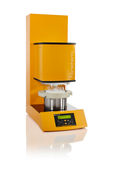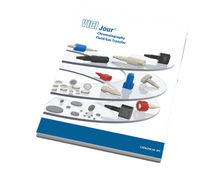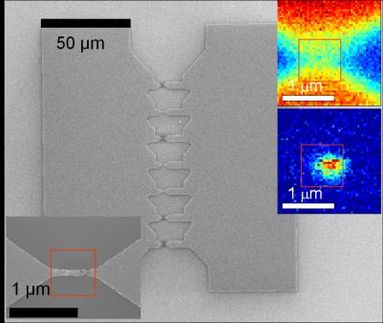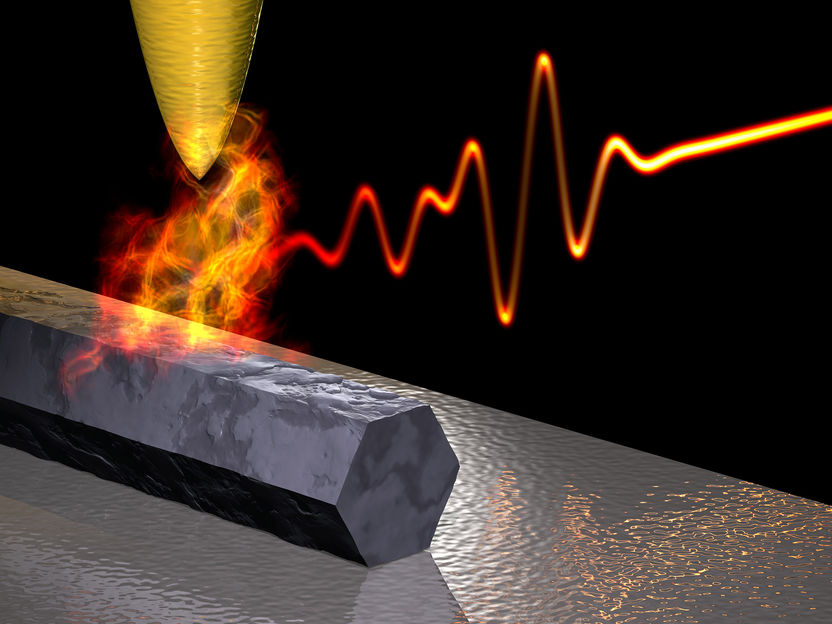Under observation - restless atoms cause materials to age
Atoms have the habit of jumping through solids - a practice that physicists have recently been able to follow for the first time using a brand new method. This scientific advance was made possible thanks to the utilisation of electron synchrotrons. The detailed findings of the project, backed by the Austrian Science Fund FWF, were recently published in NATURE MATERIALS. The work unlocks new potential for the study of material ageing processes at the atomic level.
Now and then, things can get pretty "wild" in solids. For example, billions of atoms in a gold ring can shift position every second. However, it is not just ordinary people who cannot see the atoms jumping around - physicists too have long been unable to witness this process for themselves. However, there is one very good reason in particular why scientists should want to change all that. The restlessness of atoms is responsible for ageing, and therefore the loss of specific material properties.
Scientific understanding of atomic movement has now been significantly enhanced. A team of researchers from the Faculty of Physics at the University of Vienna have pioneered a method to directly track atoms as they jump through solids. To achieve this breakthrough, the team applied state-of-the-art technology in the form of the European Synchrotron Radiation Facility in Grenoble, France, which creates special X-rays of exceptional intensity and quality. These X-rays allowed the researchers to observe the movement of atoms in a copper/gold alloy.
The scientists discovered how far and in what directions atoms jump, and how this movement is affected by temperature. Team member Mag. Michael Leitner explains: "Our investigations have shown that, at a temperature of 270 degrees Celsius, atoms change position in the crystal lattice about once per hour. But that's not all. If we increase the temperature by just 10 degrees Celsius, the jump rate of the atoms doubles. And, of course, the same happens in reverse - if the temperature drops by 10 degrees, the atoms only jump half as often."
In the future, the recently accomplished experiment will serve as a basis for the measurement of atomic movement in numerous, technically important metallic systems. This is an important first step in understanding the ageing processes of materials, which is due to the internal unrest of atoms. For example, to ensure that a car engine does not wear and that a computer can function properly, foreign atoms need to be allocated to specific positions under controlled production conditions, usually at high temperatures. Unfortunately, these atoms also tend to leave their "allocated" positions quickly when exposed to high temperatures and, as a result, the materials lose their desired properties.
Quite apart from the findings on atomic movement yielded by the experiment, the very implementation of the project itself is an achievement. Indeed, it was only the ingenious use of various filters that enabled the scientists to extract special "coherent" X-rays from the synchrotron. This alone constitutes an enormous advance in the Vienna-based physics team's field of research. Mag. Leitner: "Work is currently underway to enhance the quality of X-rays even further. For example, the European X-ray Free-Electron-Laser is being built in Hamburg, Germany. This laser will open up a whole range of new and exciting possibilities."
Original publication: M. Leitner, B. Sepiol, L. Stadler, B. Pfau & G. Vogl; "Atomic diffusion studied with coherent X-rays"; Nature Materials 2009, 8.
Most read news
Topics
Organizations
These products might interest you

FIBRETHERM by C. Gerhardt
Automatic Fibre Extraction for Feed Analysis
FIBRETHERM from C. Gerhardt: Efficient – Precise – Method-Compliant

VICI Jour Katalog 15INT by VICI
The VICI Jour Catalog - Accessories for (U)HPLC and Liquid Handling
Capillaries, Tubing, Fittings, Filters, Safety-Products, Tools and much more

Hahnemühle LifeScience Catalogue Industry & Laboratory by Hahnemühle
Wide variety of Filter Papers for all Laboratory and Industrial Applications
Filtration Solutions in the Life Sciences, Chemical and Pharmaceutical Sectors

Get the analytics and lab tech industry in your inbox
By submitting this form you agree that LUMITOS AG will send you the newsletter(s) selected above by email. Your data will not be passed on to third parties. Your data will be stored and processed in accordance with our data protection regulations. LUMITOS may contact you by email for the purpose of advertising or market and opinion surveys. You can revoke your consent at any time without giving reasons to LUMITOS AG, Ernst-Augustin-Str. 2, 12489 Berlin, Germany or by e-mail at revoke@lumitos.com with effect for the future. In addition, each email contains a link to unsubscribe from the corresponding newsletter.
























































